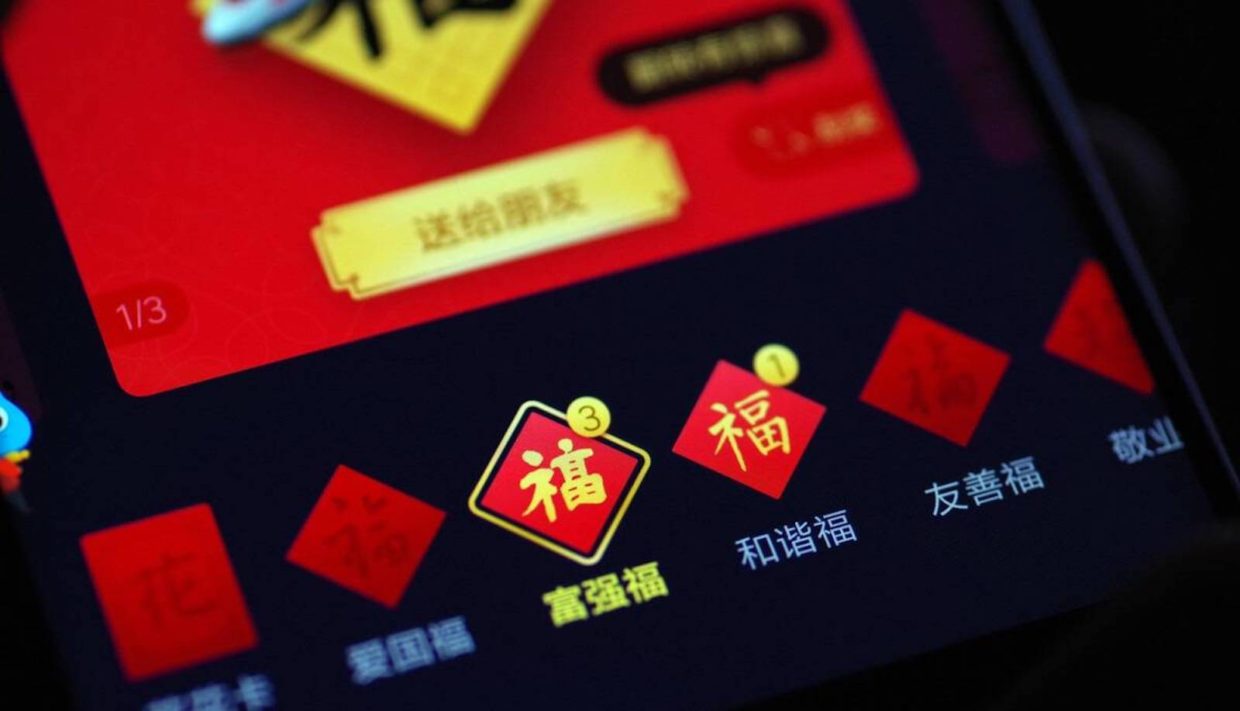Ahead of the upcoming Chinese New Year (CNY) festival, tech giant Ant Group is throwing all its weight behind a range of metaverse celebrations and promotions. The company recently launched several metaverse initiatives to mark the most important traditional Chinese holiday, combining various e-commerce activities with entertainment functions that aim to preserve CNY cultural practices.
Via the front page of Ant Group’s digital payment app Alipay, users can enter the digital “Fortune Park” (福气乐园), which gives users the chance to create their own avatars and dress them in digital outfits, some of which are limited editions that can be unlocked upon completing certain tasks. A dozen or so consumer brands, including Disney and art toy brand Pop Mart, have set up virtual stores in the park, where visitors can enter into gift lotteries, directly purchase items, and join brand memberships.
The park also features a series of mini-games, many of which include traditional CNY customs such as lion dances, shadow plays, and fireworks. By playing these games, Alipay users can collect “Fortune Points” (福气值) and exchange them for small cash rewards and special covers of digital red envelopes. To extend user participation, Alipay is distributing $7.4 million (50 million RMB) to users who accumulate more than 50,800 points.
In addition, the “Fortune Park” enables users to socialize with other “strangers” by sending greetings and trading “Five Fortune Cards” (福卡). Introduced in 2015, a complete series of “Five Fortune Cards” contains five different cards that each has the word “fortune” on it but written in different styles of calligraphy. They can be collected by using Alipay functions such as scanning the QR code at the outlets of participating merchants and logging into mini-programs.
This year, users who collect all five cards between January 10 and 21 will receive a reward from a $73.9 million (500 million RMB) gift pool on Chinese New Year’s Eve. Users also have the option to turn in their cards for extra opportunities to play mini-games and gain points in the park. Notably, users who collect all five cards will also receive a limited-edition digital collectible featuring the word “fortune” from Alibaba’s collectibles platform Jingtan.
By allowing users to exchange the cards in its “Fortune Park,” Alipay encourages more users to log into the metaverse.
Meanwhile, Alibaba’s e-commerce app Taobao is hosting its first metaverse livestream platform, entitled “Futuristic City” (未来城), which specifically advertises “CNY goods” (年货), which are items that people tend to purchase to reward themselves during the festival. This year, Taobao is cooperating with ten Chinese provinces and localities, including Sichuan, Yunnan, Suzhou, and Tianjin, under the guidance of China’s Ministry of Commerce.
In the metaverse, users can explore shops using their avatars, watch livestreams that introduce the special goods offered by each region, and directly place orders. The initiative is in line with China’s efforts to promote high-quality development by featuring rural products while also providing an educational experience for visitors to let them learn about how the CNY festival is celebrated in different parts of China. On Weibo, the hashtag “Taobao launches the first metaverse livestream room” has garnered 22.6 million views to date.
The commercial implications of Alibaba’s CNY metaverse initiatives are obvious. As digital engagement becomes ever more important in China, few brands would want to turn down the opportunity to be present in the metaverse launched by China’s dominant digital payment and e-commerce apps.
Indeed, according to Alipay’s statement on January 17, over 30,000 international and domestic brands participated in this year’s “Five Fortune Cards” campaign, a nearly 30-fold increase compared to last year. Pop Mart had three million visits to its Alipay mini-program six days into the card-collection campaign, with its transaction volume on Alipay increasing 300 percent compared to last month.

Alipay’s “Fortune Park” has proven popular among Gen Zers.
While users have many ways to collect the cards, it is undeniable that “Fortune Park” has become an integral part of the campaign’s ecosystem and has contributed to attracting traffic to brands’ mini-apps.
However, the impact of virtual platforms on Alibaba’s overall metaverse ambition could be even more profound. By tying CNY and the metaverse together, Alibaba significantly broadens the targeted audience of its metaverse initiatives. This year, anyone who collects all five fortune cards will be introduced to Jingtan and digital collectibles, and as of January 16, over 70 million people have completed their collections. In 2021, about 300 million people collected all the cards.
Those who collect points in “Fortune Park” will recognize that the metaverse is not just a trendy concept discussed by tech analysts but an immersive, easy-to-access platform that can bring real-life benefits. While Alibaba’s previous metaverse retail events, such as the 618 and Double 11 shopping festivals, mainly feature luxury and high-end consumer brands and target millennial and Gen-Z consumers, elder consumers shopping for affordable CNY goods can also be introduced to the metaverse.
Moreover, if a CNY metaverse were to become a recurring feature, it could evolve into new CNY traditions in the digital age. In recent years, a common complaint in China has been that the CNY is losing its allure (年味淡了). Thanks to the rising living standards, Chinese consumers no longer have to wait till CNY to reward themselves with premium items, and firework bans have led to “silent CNY” in big cities. The shortened holiday schedule also slashes the time people have to visit family and friends.
In this metaverse, some of these traditions are digitally preserved, while interactions such as visiting the virtual “Fortune Park” and collecting rewards could become new CNY practices for digitally savvy Chinese consumers.
Other Chinese tech giants, such as Baidu and Kuaishou, have made collecting fortune cards a must-have feature for their CNY promotions. With its CNY metaverse platforms, Ant Group and by extension Alibaba might just have announced that the phygital era of CNY celebration has arrived.



